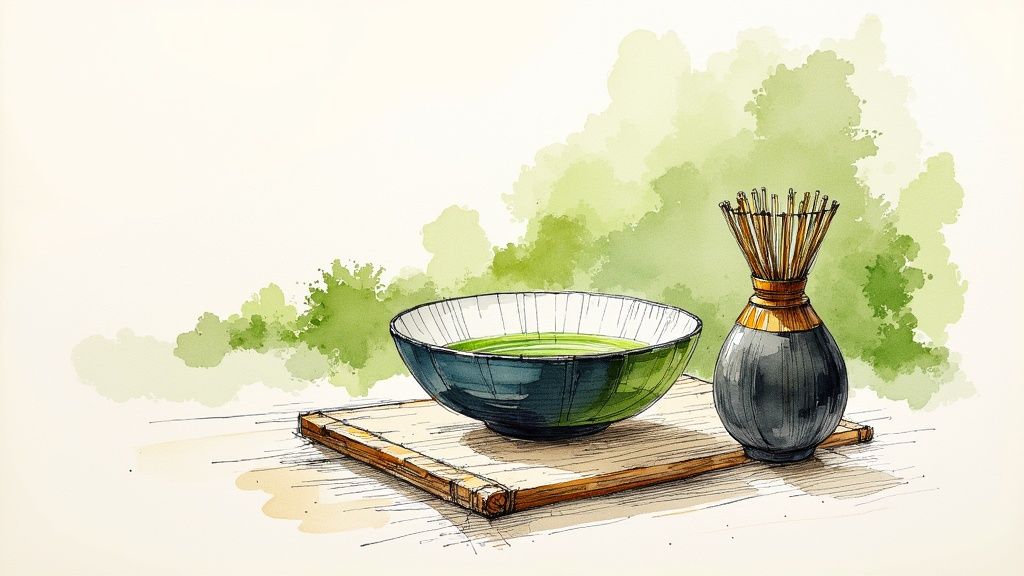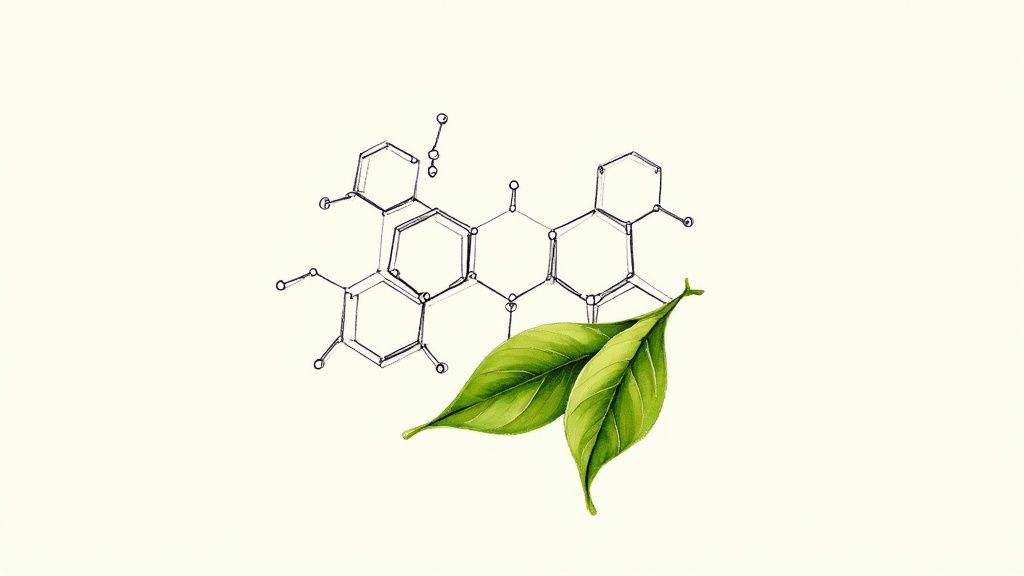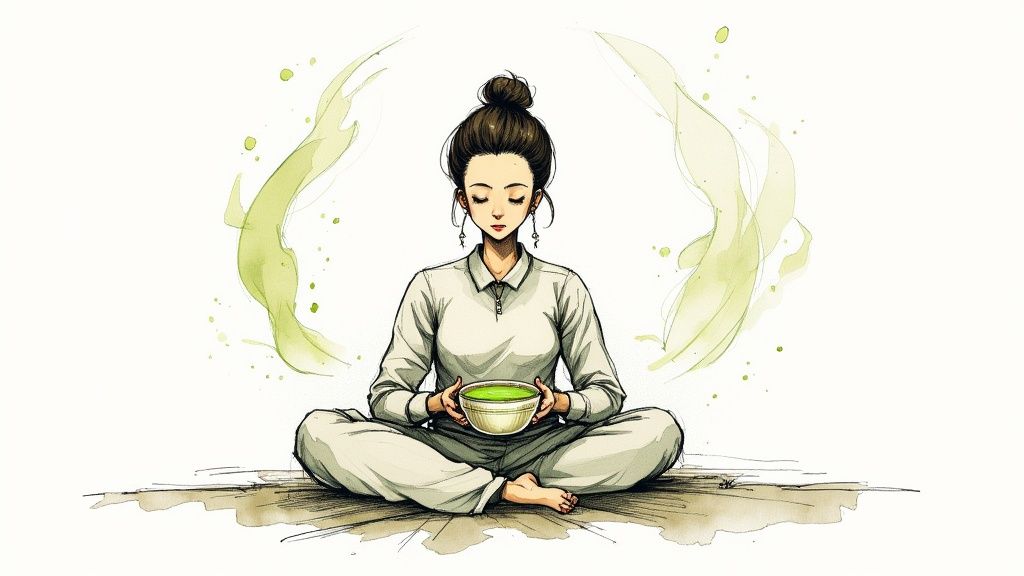Understanding the Power of Matcha's Antioxidant Profile

The stunning green color of matcha reveals its exceptional antioxidant content, which comes from its unique preparation method. Unlike regular green tea where you steep and discard the leaves, matcha is made by grinding whole tea leaves into a fine powder. When you drink matcha, you consume the entire leaf, which means you get the full dose of beneficial compounds. This simple difference explains why matcha packs such a powerful antioxidant punch.
Comparing Matcha to Other Green Teas
The numbers tell an impressive story – matcha contains up to 137 times more antioxidants than standard green tea varieties. This dramatic difference comes mainly from matcha's high levels of epigallocatechin gallate (EGCG), a compound known for fighting disease. Think of it this way: one cup of matcha gives you the antioxidant benefits of multiple cups of regular green tea. This concentrated boost helps protect your cells from damage. For more details, check out: Science-Backed Advantages of Matcha Tea.
The Influence of Growing and Harvesting Practices
The way farmers grow matcha tea plays a key role in its antioxidant content. By covering the plants with shade cloths for several weeks before harvest, they boost the leaves' production of chlorophyll and amino acids. This careful growing method not only creates matcha's rich flavor and bright color but also increases its health benefits.
Matcha Grades and Their Antioxidant Content
Quality matters when it comes to matcha's benefits. Ceremonial grade matcha, known for its smooth, sweet taste and bright green color, typically has more antioxidants than culinary grade. This is because ceremonial grade comes from younger, more tender leaves with higher concentrations of beneficial compounds. While culinary grade matcha still offers plenty of health benefits, it's usually reserved for cooking and baking where its stronger flavor works well.
Preserving Matcha's Antioxidant Potency
The way you prepare matcha affects how many antioxidants you get from each cup. Water that's too hot can break down the EGCG and other beneficial compounds. For best results, use water around 175°F (80°C) instead of boiling water. This helps protect the antioxidants so you get the most health benefits from your matcha. When you pay attention to these details – from how the tea is grown to how you prepare it – you get the full power of matcha's antioxidant properties.
Transforming Your Mental Performance with Matcha

Many people know matcha for its antioxidant content, but its effects on brain function make it truly special. Buddhist monks have long valued matcha for creating a unique state of "calm alertness" – something quite different from a typical caffeine buzz. This balanced mental state comes from two key compounds working together: caffeine and L-theanine.
The Dynamic Duo: Caffeine and L-Theanine
What sets matcha apart from coffee and other caffeinated drinks is this special pairing. The caffeine provides mental clarity and focus, while L-theanine brings a sense of relaxation without making you sleepy. Instead of getting jittery like you might with coffee, matcha gives you steady, focused energy. Research backs this up – studies show that people who drink matcha regularly see improvements in their attention span, reaction speed, and memory. You can work productively without worrying about crashing later.
Optimizing Matcha for Cognitive Enhancement
To get the most brain-boosting benefits from your matcha, keep these tips in mind:
- Dosage: Everyone responds differently to caffeine, so start small with 1/2 to 1 teaspoon of matcha powder. You might find that taking smaller amounts throughout the day works better than one big serving.
- Timing: If you need to be sharp for a presentation, drink your matcha 30-60 minutes before to let the compounds take effect. For daily use, having matcha in the morning helps set a focused tone for your whole day.
- Preparation: While traditional whisking creates that classic frothy texture, it's fine to use a shaker bottle or blender when you're busy. Just remember to use water at about 175°F (80°C) to keep all the good compounds intact.
Matcha's Neuroprotective Potential
Beyond the immediate focus and clarity, matcha may help protect your brain over the long term. Its high levels of antioxidants, especially EGCG, shield brain cells from damage by free radicals. Some research suggests these compounds could help reduce the risk of cognitive decline as we age. While scientists are still studying exactly how matcha supports brain health, the evidence so far points to real benefits for keeping your mind sharp throughout life. Making matcha part of your daily routine isn't just about feeling focused now – it's an investment in your future cognitive wellbeing.
Supporting Heart Health Through Daily Matcha Rituals

Matcha offers more than just a mental boost – research shows it can significantly benefit your heart health when consumed regularly. The concentrated antioxidants and unique compounds in this vibrant green tea work together to protect and strengthen your cardiovascular system in several key ways.
The Role of Matcha in Cholesterol Management
One of matcha's most notable heart benefits is its effect on cholesterol levels. Research indicates that drinking matcha regularly helps reduce LDL (low-density lipoprotein) cholesterol – the type that can build up in arteries and increase heart disease risk. Studies on green tea consumption show that matcha's concentrated form may be especially effective at lowering these harmful LDL levels. At the same time, some evidence suggests matcha can boost beneficial HDL cholesterol, helping create a healthier overall cholesterol balance.
Matcha and Blood Pressure Regulation
The natural compounds in matcha also appear to help maintain healthy blood pressure. The L-theanine amino acid promotes a state of calm relaxation, which can help reduce stress-related blood pressure spikes. Meanwhile, matcha's potent antioxidants protect and support blood vessel function. As blood vessels stay flexible and strong, blood can flow more easily, reducing strain on the heart and helping prevent high blood pressure over time.
Anti-inflammatory Effects and Heart Health
Long-term inflammation in the body is a major contributor to heart disease. The high levels of EGCG antioxidants in matcha help fight this inflammation and protect blood vessel health. Research backs this up – one study found that men who drink matcha regularly have lower rates of heart disease. By reducing inflammatory damage throughout the cardiovascular system, matcha provides ongoing support for heart wellness.
Practical Tips for Incorporating Matcha for Heart Health
To get the most heart-protective benefits from your matcha:
- Consistency: Make matcha part of your daily routine rather than drinking it occasionally.
- Quality: Choose ceremonial grade matcha powder, which contains higher levels of beneficial compounds.
- Preparation: Use water at about 175°F (80°C) to preserve the delicate nutrients.
- Lifestyle Integration: Pair your matcha habit with other heart-healthy choices like balanced meals, regular movement, and stress management.
By making matcha a consistent part of a heart-healthy lifestyle, you can tap into its protective properties for your cardiovascular system. The simple act of preparing and sipping matcha each day is an investment in your heart's long-term health and vitality.
Matcha's Natural Weight Management Benefits

Many people are curious about matcha's influence on weight management and overall health. Let's look at the real, evidence-based ways this traditional green tea powder can support your wellness goals when paired with a balanced lifestyle. Understanding the specific benefits, while being realistic about what matcha can and cannot do, helps set proper expectations.
The Science Behind Matcha and Metabolism
Matcha contains two key compounds that affect metabolism: caffeine and EGCG (epigallocatechin gallate). These work together in interesting ways. The caffeine gently raises your core temperature through a process called thermogenesis, which burns extra calories. At the same time, EGCG helps break down fat cells so your body can use them for energy. This means having matcha may give your daily calorie burn a small but measurable boost. Keep in mind that these effects are modest – matcha works best as part of an overall healthy routine.
Getting the Most from Matcha
When you drink matcha matters. Having it before exercise can help fuel your workout while promoting fat burning during activity. Instead of drinking it all at once, try spacing out 2-3 cups throughout your day. For example, start with matcha in the morning, then have another cup in the early afternoon. This helps maintain steady energy levels. Since people respond differently to caffeine, pay attention to how matcha affects you and adjust the amount and timing to match your needs.
Setting Realistic Goals with Matcha
While matcha can support your health goals, it's not a shortcut to weight loss on its own. The real benefits come from combining matcha with nutritious food choices, regular movement, and good sleep habits. If you're sensitive to caffeine, start with small amounts of matcha and don't overdo it. Focus on making matcha part of your daily wellness routine alongside mindful eating and staying active. High-quality matcha ensures you get the most nutrients, but remember – even the best matcha works gradually as part of balanced, sustainable lifestyle changes. With consistent healthy habits, matcha can be one helpful tool in your wellness journey.
Boosting Your Body's Natural Defense Systems
When it comes to supporting your immune system, matcha tea offers some remarkable benefits beyond its positive effects on heart and brain health. The unique compounds found in matcha work together to strengthen your body's natural defenses in several key ways.
The Power of Matcha's Antioxidants for Immunity
The bright green color of matcha signals its rich antioxidant content, especially EGCG, which plays a vital role in supporting immune function. These antioxidants help protect your cells from damage caused by free radicals – unstable molecules that can weaken your immune system over time. Research shows that EGCG specifically helps boost the activity of natural killer cells, which are white blood cells that fight off infections and potentially harmful cells.
Matcha and Inflammation: A Balancing Act
Your body needs some inflammation as part of a healthy immune response, but too much can be harmful. Matcha helps maintain this delicate balance through its natural anti-inflammatory properties. It can help reduce excess inflammation that may lead to health problems while still allowing your immune system to respond effectively when needed. This balanced approach helps keep your immune system working at its best.
Strengthening Immune Responses with Matcha's Unique Compounds
The combination of L-theanine and caffeine in matcha sets it apart from other drinks. L-theanine helps reduce stress, which often suppresses immune function. This means you can enjoy matcha's energizing effects without compromising your immune system. Studies also suggest that matcha may help increase the production of important immune cells and antibodies, giving your body's defenses an extra boost.
Practical Strategies for Maximizing Matcha's Immune Benefits
To get the most immune support from your matcha tea, try these practical tips:
- Consistent Consumption: Drink 1-2 cups daily rather than occasionally to maintain steady levels of beneficial compounds in your system
- Optimal Preparation: Use water heated to around 175°F (80°C) to preserve matcha's delicate nutrients
- Synergistic Practices: Combine matcha with other healthy habits like eating well, exercising regularly, getting enough sleep, and managing stress
Remember that matcha works best as part of an overall healthy lifestyle. By making it part of your daily routine along with other good habits, you can help strengthen your immune system naturally for better long-term health.
Creating Your Personal Matcha Success Strategy
Getting the most from your matcha tea means mastering key essentials like selection, storage, and preparation. When you understand these fundamentals and pair them with mindful daily practices, you'll unlock matcha's full benefits while creating rituals that fit your lifestyle.
Selecting and Storing Your Matcha for Optimal Freshness
The foundation starts with choosing quality matcha. Look for bright green ceremonial grade powder for pure drinking pleasure and maximum health benefits. While culinary grade works well for baking and cooking, it typically offers less intense flavor and fewer antioxidants. Think of it like olive oil – you want the good stuff for sipping.
Proper storage makes a big difference in keeping your matcha fresh. Store it in an airtight container away from light and moisture. Pop it in the fridge to maintain its vibrant color and rich nutrients longer. These simple steps help preserve all the good stuff you're drinking matcha for in the first place.
Mastering Matcha Preparation Techniques
While the traditional whisking method is wonderful, you can also use a shaker bottle or blender for quick daily prep. Just remember to heat water to about 175°F (80°C) – boiling water ruins the delicate compounds and creates bitterness. The right temperature brings out matcha's smooth, sweet notes while protecting beneficial elements like EGCG.
Beyond basic hot matcha, get creative with lattes, smoothies and baked treats. A matcha smoothie before exercise provides steady energy without jitters. After workouts, try a soothing matcha latte to help muscles recover while you unwind.
Integrating Matcha Into Different Lifestyles
No matter your schedule, matcha can work for you. Office workers might swap their second coffee for mid-morning matcha to stay sharp without the caffeine crash. Students can use it to maintain calm focus during study sessions. Athletes appreciate how matcha's caffeine and L-theanine combo supports both performance and recovery.
Pay attention to what timing and amounts work best for your body. Some people do better with small servings throughout the day rather than one big dose. Test different approaches to find your ideal matcha rhythm.
Troubleshooting and Tracking Your Matcha Journey
Common issues like bitter taste or clumpy texture have simple fixes. If your matcha is too bitter, try using less powder or cooler water. Sifting the powder before mixing prevents clumping. Small tweaks make a big difference.
Keep track of how matcha affects your energy, focus and mood. If you're drinking it for specific health goals like heart wellness or weight management, check with your healthcare provider about smart ways to include matcha in your overall plan. This thoughtful approach helps you get the most from your daily matcha practice.
Ready to discover quality matcha that fits your needs? Visit matcha-tea.com to explore our carefully selected teas and find your perfect match. Experience the authentic flavor and benefits of premium matcha today.
